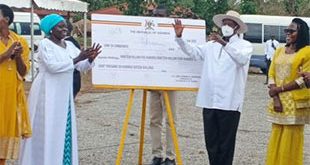
Kampala, Uganda | THE INDEPENDENT | While the Ministries of Education and Health continue pushing for the implementation of the botched National Sexuality Education Framework, religious groups have highlighted where the government went wrong with the document which was halted just after its launch.
Fr. Ronald Okello, the Executive Secretary for Education at the Uganda Episcopal Conference told Uganda Radio Network this morning that the framework wasn’t age-appropriate and that it was shifting the traditional roles of parenting from parents to teachers.
“The content is foreign and we feared this would erode our culture. Some of the things they say it would address are already available on the syllabus. They only needed to retool teachers to do them well,” Fr Okello said.
According to the government, the framework was providing guidance on childhood development, reproductive health and hygiene which can save young people from among others early sex and its associated problems in addition to sexually transmitted diseases like HIV.
The framework had been divided into themes for each age group and what content they would have access to. The age group 3 -5 that is most controversial was supposed to learn how to follow instructions and knowing themselves or anatomy where children were to be taught how to differentiate their gender.
But Rev. Richard Rukundo, the Church of Uganda Provincial Coordinator for Children’s Ministry Programs says there was much more than this in the document. He says he saw content that they usually teach in Church during pre-marital counselling being prepared for minors.
On her part, Shkt. Radhiyyah Lukwiya Namakula, the Secretary for Women, Youth and Children at Uganda Muslim Supreme Council said they raised a red flag when the technical team from the the government went to them for consultations because it appeared the goal of the the framework was to teach sex. She wondered why it wasn’t called Health Education and left at that challenging the pushers to avail evidence that children are no longer learning anything from home.
Responding to these concerns, Rossette Nannyanzi, a Gender Technical Advisor at the Ministry of Education said that they thought that the framework would be a strong component for school health.
The process she said started as early as 2016 but issues of the name not being conducive came up immediately after the launch yet different stakeholders including the religious leaders had been consulted.
She says they are still brainstorming on what the new name would be but notes that the leaders are running away from the reality that many parents are now internally displaced something that has been blown during the lockdown with issues of domestic violence and sexual assault being on the rise.
She says that having the framework implemented will help reverse grim statistics of children dropping out of schools now estimated at only 30 percent of those that start, completing the primary cycle and HIV infections among others.
However, last week, Members of Parliament attending a meeting organized by a Civil Society Organization Joy for Children said that the government and donors who are pushing for the sexuality framework as a solution to curbing HIV infections, teenage pregnancies and keeping children in school are pressing the wrong button.
For instance, Kasambya County Legislator Mbwatekamwa Gaffa said the government should first tackle poverty for families to afford simple things like sanitary pads for their girl children.
For him, the framework is useless but a money cow for those involved. He says teachers can in their normal workloads add a minute to talk about sexuality without any documents to guide them.
******
URN
 The Independent Uganda: You get the Truth we Pay the Price
The Independent Uganda: You get the Truth we Pay the Price



